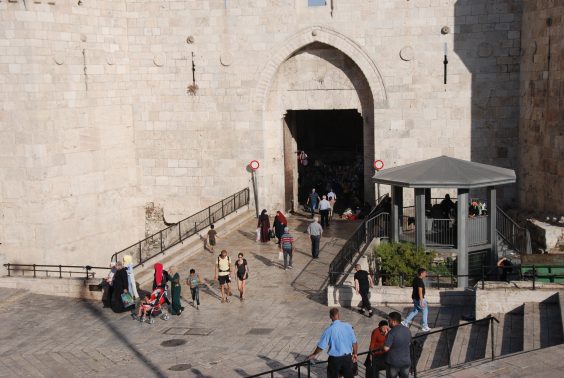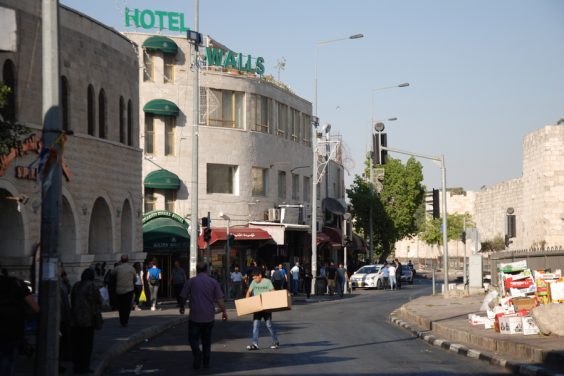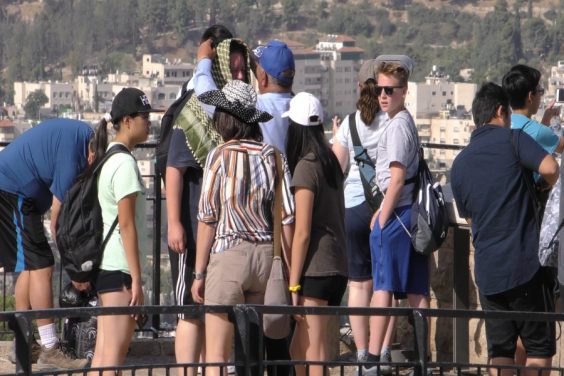Pilgrims from Indonesia, Malaysia, Turkey and Jordan flock to Al Aqsa Mosque, Islam’s third holiest site
Jerusalem, an ancient city steeped in history, culture and religion, has long been a top tourist destination. Though Jewish and Christian travelers make up the lion’s share of tourists to Israel and the West Bank, the number of Muslim sightseers to east Jerusalem has risen rapidly in recent years.
According to tour guides and hotel managers working on the Palestinian side of the sector, the Muslim market is one of the fastest growing areas of business. “It started growing in the last few years,” Awni E. Inshewat, the general manager of the Seven Arches Hotel which lies atop the scenic Mount of Olives, told The Media Line. “There are many Muslims who come from Indonesia, Turkey and Jordan.”
Official 2017 figures from Israel’s Tourism Ministry support Inshewat’s statements, though Muslims only constitute 2.8 percent of all tourism to Israel. In 2015, nearly 75,000 people from Muslim countries entered Israel; in 2016, the number rose to 87,000. Last year, Muslim tourists in Israel reached some 100,000, many of which from Jordan, Turkey, Indonesia and Malaysia.
The rise in Muslim tourism comes as Israel’s Central Bureau of Statistics recently announced a record-breaking year for tourism, with a 19% increase recorded in the first half of 2018 over last year, translating into some 2.1 million travelers who entered Israel from January to June.
Muslim pilgrims who visit the Holy Land tend to opt for east Jerusalem hotels due to their proximity to Islam’s third holiest site—the Al Aqsa Mosque. Located atop the Temple Mount plaza or the Haram al-Sharif in the Old City, a holy site that is venerated by Jews, Christians and Muslims alike. Though the area has become a flash-point in the Israeli-Palestinian conflict over the years, it is the single biggest draw for Muslim pilgrims.

Visitors and residents pass through the Old City’s Damascus Gate. (David Rawlings)
According to Islamic tradition, the Prophet Muhammad was transported on a sacred night journey from Mecca to the Al Aqsa Mosque.
“For the first 100 years of Islam, the direction of prayer was actually to Jerusalem. So this location is extremely important in Islam,” Firas Amad, the deputy-general manager of the nearby Holy Land Hotel, told The Media Line. He added that many Muslims stop in Jerusalem before continuing their religious pilgrimage to Mecca, the birthplace of Islam.
Unlike European tourists or those coming on Christian pilgrimages from other countries, Muslim sightseers to the Holy Land tend to have a much narrower travel program, with many spending their entire visit in east Jerusalem. A small number also visit the Cave of the Patriarchs in the West Bank city of Hebron, where the biblical couples of Abraham and Sarah, Isaac and Rebekah, and Jacob and Leah were believed to have been buried thousands of years ago.

A hotel just opposite the Old City in east Jerusalem. (David Rawlings)
For this reason, “the program for Muslim groups is much shorter than for Christian groups,” Sa’id N. Mreibe, a Christian tour guide, told The Media Line.
Give the gift of hope
We practice what we preach:
accurate, fearless journalism. But we can't do it alone.
- On the ground in Gaza, Syria, Israel, Egypt, Pakistan, and more
- Our program trained more than 100 journalists
- Calling out fake news and reporting real facts
- On the ground in Gaza, Syria, Israel, Egypt, Pakistan, and more
- Our program trained more than 100 journalists
- Calling out fake news and reporting real facts
Join us.
Support The Media Line. Save democracy.


Mreibe works with English speakers for the most part, but he has also noticed an increase in visitors from Muslim countries. “East Jerusalem is a very important part of their visit because of the mosque.”
Challenges for the Muslim Sector
The significant rise in Muslim tourists to east Jerusalem has caused pressing concerns, travel industry experts note. For instance, many wishing to visit Israel from Muslim-majority countries have to apply for travel permits or visas from the Israeli Ministry of Interior; and these permits are not always granted.
“If a travel agent applies on behalf of 60 people, only 20 or 30 tourist receive approval. So there are limitations to who can come,” Inshewat, from the Seven Arches Hotel, said.
Mejdi Tours is a U.S.-based tour operator that specializes in dual-narrative visits, featuring both Palestinian and Israeli tour guides, as well as personalized interfaith expeditions to the Holy Land. Aziz Abu Sarah, a Palestinian who co-founded the company with Scott Cooper, a Jewish American, said most tours for Muslim visitors run between six to 10 days. Mejdi brings roughly 1,800 people to Israel per year.
“One of the biggest complaints we get is that when people arrive at the airport, they have to through extra searches and questioning,” Abu Sarah told The Media Line. “Many Muslims are worried they will be rejected at the airport, a legitimate fear that I don’t think the Ministry of Tourism and Ministry of Interior have dealt with.
“The Ministry of Tourism can promote trips for Muslims to Israel, but unless the Ministry of Interior understands that refusing certain tourists entry is going to be a problem, Muslim travel will remain a sore spot,” he added.
Despite problems of entry, Abu Sarah said he did notice an increase in Muslims, especially from the U.K., who wished to visit Jerusalem, a phenomenon he says was unthinkable until recently.
“Ten or 15 years ago, there were barely any Muslim tourists coming to Israel,” Abu Sarah asserted. “They have waited for the end of the Israeli-Palestinian conflict for so long and it has not happened. But because they see the city as vitally important, many have realized that if they want to see it, they must just go.”
Another issue facing the growing market is the lack of tourist infrastructure and garbage collection services. “We need more cleaning services on the streets, as well as more pedestrian streets,” Amad asserted. “We do pay taxes and of course we expect to get the same level of services that are offered elsewhere, whether in west Jerusalem, in Herzliya or Tel Aviv.”
One of the hotels that caters to Muslims in particular is the Hashimi Hotel, located a short distance from Al Aqsa. Hotel guests there—many from the U.K., Malaysia, and Indonesia—declined to comment to The Media Line about their experiences in the city, as did other Muslim travelers roaming the narrow alleyways of the Old City. An east Jerusalem shopkeeper named Jawad explained that many tourists visiting from Muslim countries are reluctant to associate themselves with Israel for fear of reprisals back home.
“Some Muslims don’t want to come here under the law of Israel, and until it will be Palestine they refuse to come,” Jawad added. “For some from Arab countries, visiting Israel is simply not allowed.”
Beyond politics, which certainly play a role in the decision of Muslim tourists whether to visit or avoid Israel, another pressing issue facing the sector is the lack of space. Many of the hotels near the Old City are booked solid throughout the high tourist season of summer.
“There’s a noticeable lack of rooms in Jerusalem in general and specifically here in east Jerusalem,” Amad told The Media Line. “We’ve been hearing about plans from the municipality to increase the number of rooms, to incentivize hotels and offer subsidies. We hope these plans will be achieved because we want to see growth in the sector.”
A Top Tourist Market for Christians
The Muslim market is not the only one that is expanding. Christian pilgrims still make up the top tier of tourists coming to the Holy Land, with more than 1.7 million visiting Israel in the past year alone, according to the Ministry of Tourism.
Though they come from a variety of countries and denominations, a surge in pilgrims has come from Nigeria and China. One of the most popular Christian destinations in Israel is Gethsemane, just outside Jerusalem’s Old City walls. It comprises a beautiful garden with ancient olive trees situated at the foot of the Mount of Olives, where Jesus is believed to have prayed before his crucifixion.

Tourists gather on the Mount of Olives overlooking the Old City in east Jerusalem. (Maya Margit)
Bola Are, a prolific Nigerian Gospel singer who has recorded dozens of albums over her decades-long career, was visiting the site in an organized tour.
“I’ve been coming here since 1980,” she told The Media Line. “I’ve been here several times and every time I come I’m renewing my faith.”
Some believe the uptick in Christian visitors is due to the relatively stable security situation in Jerusalem.
“Business has been excellent, especially in the last year,” Mreibe, the Christian tour guide, told The Media Line. “I mainly provide Christian tours to a variety of pilgrims, mostly English speakers from North America, from the U.K., Australia, and sometimes from the Far East like the Philippines, India or Indonesia. Their main interest is the life of Jesus and the history of Christians in the Holy Land.”
Felipe Santos is a managing partner of the U.S.-based Genesis Tours, which focuses on pilgrimage geared to Evangelical Christians and Catholics.
“We work mostly with Americans, but also with people from all over the world,” Santos told The Media Line. “Latin America, of course, is a strong market and now China is growing,” he said, adding that China is home to roughly 31 million self-declared Christians.
While the Christians continuously come to Israel, the new phenomenon of Muslim travelers is providing a boost to the tourism sector, which hotel managers in east Jerusalem hope will continue to thrive.
“There are days where the Israeli-Palestinian conflict affects the flow of visitors, but for years now the situation is quiet and tourists are coming,” Inshewat, from the Seven Arches Hotel, said. “It’s growing day after day.”